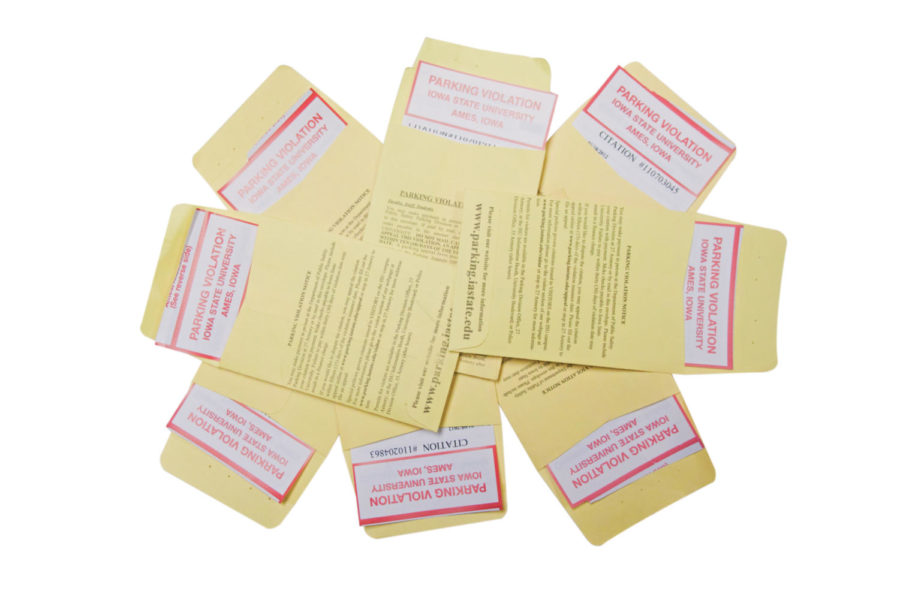Permits, tickets drive ISU Parking Division
March 18, 2012
The ISU Parking Division estimates that more than 7 million cars come onto campus each year.
The Parking Division oversees nearly 19,000 parking spaces to try and accommodate for the large number of vehicles that pass through the university each day. This also means a large number of permits are sold and yellow tickets appear on cars each year.
“We’re a division that … the only inventory we have is space, so we either permit it or sell it as a meter or prepay spot,” said Mark Miller, ISU Parking Division director. “Parking is a self-supporting enterprise; that means we don’t get any state dollars like some of the other departments on campus. We generate all of our own revenue to pay for all the expenses such as snow removal, crack filling, line painting and salaries.”
In the 2011 fiscal year, the ISU Parking Division handed out 70,283 tickets. This is a 10,000-ticket decrease since the 80,549 tickets given in 2009.
Tickets are given for multiple reasons ranging from illegal parking, parking in reserved spaces and overtime at meters.
The parking division sold 15,344 annual permits and 5,126 temporary and summer permits during the 2011 fiscal year.
“People don’t like to pay for the permit or the ticket, but they like the lot shoveled and no potholes, so we try real hard to maintain,” Miller said. “And to be honest, we have pretty good lots on this campus.”
According to the Parking Division, $3,549,297 was collected in revenue in 2011, coming from permits, fines, meters and several other areas. They also had $2,617,238 in expenses including maintaining the CyRide orange route from the commuter lot, snow removal, salaries and maintenance.
This left the Parking Division with $932,059, but $456,561 was used for capital projects during the year, which is used for major fixes of particular parking lots in need of extra services.
Miller said that the actual amount of money made in 2011 by the Parking Division — $475,498 — did not go toward any other department or student programs within Iowa State.
“Whatever money is left over, all that money goes into future capital projects accounts. It could be for a parking ramp and we’ve built up reserve funds for if something major were to happen,” Miller explained.
Only 100 people received nine percent of the tickets given in 2011.
“The No. 1 person got 151 tickets that year … some of those are the ones that complain the most … but if you’re getting over 50 tickets, there is just abuse going on,” Miller said
The parking division takes pictures of ticketed cars in an effort to ensure no mistakes have been made. This way they can prove if a car was in a space without the correct permit. They also chalk car tires to track how long a particular car has been in a metered space.
Miranda Fair, sophomore in linguistics, has purchased a permit in order to have legal access to parking spaces.
“I do think that the Parking Division is doing the right thing by giving out tickets,” she said. “If I have to pay to park there legally, they should have to pay for parking there illegally.”
Iowa State ranks as the lowest for amount charged in fines for improper parking and second in amount charged for overtime parking at meters and parking without a permit among the Big 12 schools. However, the university ranks as one of the highest in amount charged for altering or counterfeiting a permit, unauthorized possession of a permit and parking in an area designated for those with disabilities.
“If someone is … making their own permit, I’d rather have a higher price,” Miller said. “I think those people deserve those.”
Garret Johnson, sophomore in agricultural engineering, agreed that “if you’re at fault, then you’re at fault,” but also believes that the Parking Division gives out too many tickets.
“What I think is that they check so frequently that if you run out of minutes and come to your car two minutes after it is done, there is a ticket,” Johnson said, who has received six or seven tickets this year.
Miller said the Parking Division is always open to new suggestions and is working to continue to make things more efficient.
“We’re trying to look at some other options for out there,” Miller said.
He explained that much of the technology, such as students being able to pay using their ISU ID cards and smartphone apps, are currently too expensive or the technology is not available for the campus yet.
Any changes in fines, fees and the way the systems of the Parking Division are made by the Iowa Board of Regents from suggestions by the transportation advisory council, which contains several students.
“There’s a process in place,” Miller said. “Some people think we raise rates without doing any checking, but quite frankly, it’s the other way around. It usually takes at least a year to make any changes.”

















